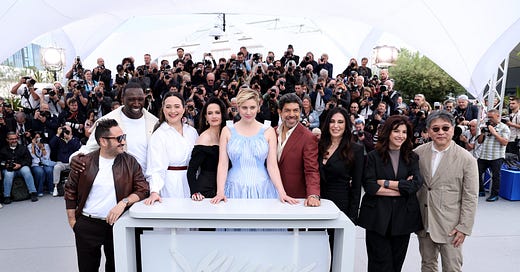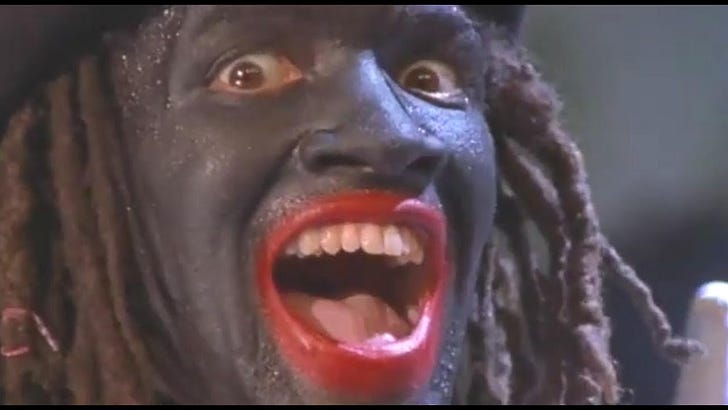As of today, the Cannes Film Festival is in full swing! (No offense to Quentin Dupieux, a wonderful interview, whose out-of-competition title The Second Act opened the festival yesterday.)
The reactions will start to roll in over the next 10 days for the films in competition for the coveted Palme d’Or. As is necessary with every film festival, the caveat must be made: don’t always believe the buzz. But given the strong track record with Cannes winners going the distance at the Oscars since Parasite won Best Picture, it behooves awards season enthusiasts to start tuning in now.
I won’t deny I have a sight-unseen favorite that I’m pulling for: Bird, the latest film from Andrea Arnold. The influential British filmmaker has won three Jury Prizes (essentially, their third-place trophy) and is long overdue to take home the Palme. Your favorite filmmakers probably love Andrea Arnold. In case you have any doubt about my devotion, I’ve written about her twice in this newsletter:
But since she’s gotten enough Marshall and the Movies ink, I’ve decided to spotlight some other filmmakers with this streamer’s guide to the Cannes Film Festival. Assuming you’re not on the Riviera (as a few readers of this newsletter are!), here’s what you can watch from the comfort of your own home to prepare for a filmmaker’s latest work that is bowing this week.
Sean Baker, Anora
The odds-on favorite for the Palme d’Or, looking at the last few years of winners, might be Sean Baker’s Anora. The film comes in with backing from Neon, who’s distributed the last 4 winners of the big prize. This comedy set in the world of sex work harkens back to one of Baker’s big breakthroughs, 2012’s Starlet. Though I suppose I’ve somewhat spoiled that film because we don’t learn what the 21-year-old adult film star Jane does until well into the runtime. That’s part of the point as we get to see her budding friendship with an 85-year-old woman she meets at a yard sale. Baker’s push to destigmatize sex work has slowly taken on a more radical dimension in his filmmaking, but in Starlet, it’s the basis for a sweet bout of what I like to call “friendship cinema.”
Starlet is available on MUBI and for free with ads on Tubi TV.
Francis Ford Coppola, Megalopolis
“There are zero commercial prospects and good for him,” an early viewer of Francis Ford Coppola’s Megalopolis told Puck. “It’s unflinching in how batshit crazy it is.” And honestly? LFG. It wouldn’t be the first time that Coppola’s grand ambitions led to a controversial Cannes premiere. The notoriously troubled shoot of Apocalypse Now, his Vietnam War opus that he claimed “is Vietnam,” won the Palme d’Or in 1979 after years of headlines about its production. Can lightning strike twice? I’m just glad the 85-year-old maestro has one last chance to leave it all on the field, and by all accounts, he’s doing just that with Megalopolis.
Apocalypse Now is available to rent from various digital platforms.
David Cronenberg, The Shrouds
I was fully convinced Crimes of the Future, David Cronenberg’s 2022 Cannes competition title that ranked #7 in my top 10 films of that year, would be his last film. But the octogenarian is back with yet another just two short years later with The Shrouds, an intriguing high-concept title involving a new technology where the living can monitor their departed loved ones. No matter the style in which he’s working, Cronenberg captures people on a threshold between two realms — often life and death or human and monster. In A History of Violence, arguably his least “genre” film ever, the Canadian wunderkind gives us both. Cronenberg shows how out-of-town visitors upend the tranquil existence of Viggo Mortensen’s Tom Stall, a small-town Midwest diner owner, by reawakening his penchant for bloody brawling. Like a switch flipping, the mobster past he thought he’d managed to outrun come rushing back. How’s that for horror?
A History of Violence is available to rent from various digital platforms.
Coralie Fargeat, The Substance
The presence of women in Cannes’ competition has long been a major problem. Beyond the aforementioned Andrea Arnold, just four female directors are competing for the Palme d’Or — a number that seems to be a ceiling to which the festival frequently reverts. I’m curious if The Substance, a body horror film featuring Demi Moore and Margaret Qualley, vaults Coralie Fargeat into the same conversation with her contemporary Julia Ducornau (2021 Palme d’Or winner for Titane). Fargeat grabbed attention with her 2018 directorial debut Revenge, a bloody and bruising tale of a woman taking … well, revenge … on her three rapists. You might think you’ve seen this movie before, but Fargeat’s adrenaline-pumping genre film takes the energy up to 11 while still keeping her vision impressively minimalist.
Revenge is available on Shudder (which offers free 7-day trials).
Christophe Honoré, Marcello Mio
If you think the “nepo baby” discourse has gotten stale, I’m hopeful that Christophe Honoré’s Marcello Mio will inject some fresh life into that. Chiara Mastroianni plays both herself and her father Marcello, the star of such Fellini films like La Dolce Vita and 8 1/2. Admittedly, it seems a bit out of left field for someone like Honoré to make the film. Or, at the very least, it’s quite different from his 2018 Cannes competition title Sorry Angel, a 1993-set queer romance between a 39-year-old with AIDS and a 22-year-old newly out of the closet. I found the film quite moving and insightful, due in large part to the soulful performance of Vincent Lacoste as the younger of the couple. (I think Lacoste may well be the future of French cinema, and I look forward to tracking where his career goes from here.)
Sorry Angel is available to rent from various digital platforms.
Jia Zhang-ke, Caught by the Tides
No one is telling the story of the most populous nation on earth better than Jia Zhang-ke. The Chinese master filmmaker has become a mainstay in the competition with Caught by the Tides, an early 2000s-set love story, representing his sixth shot at the Palme. Jia’s recent output takes recent Chinese history and attempts to put it in some serious sense of context. Such is the case with his gangster film Ash is Purest White, which is set in 2001 and 2017 as the line between the underworld and the modernizing world blurs. The anchor of it all, as is the case for so many of Jia’s films, is his wife Zhao Tao giving a powerhouse performance as a woman caught in the crossfire of violence and love.
Ash Is Purest White is available for free with ads on Tubi TV.
Payal Kapadia, All We Imagine As Light
My ears certainly perked up when friend of the newsletter Siddhant Adlakha proclaimed Payal Kapadia’s A Night of Knowing Nothing was one of the best films of the decade, my ears certainly perked up. Kapadia bears the honor of becoming the first Indian filmmaker to compete for the Palme d’Or in 30 years with All We Imagine As Light, a Mumbai-set relationship drama. I’ll be curious to see how Kapadia transfers the mastery of her form from non-fiction into fictional filmmaking. A Night of Knowing Nothing transforms student protests in the early years of Narendra Modi’s repressive rule into a collage-like experience collapsing personal and political boundaries. If the name Chantal Akerman means anything to you, then this movie will be right up your alley. (And if you’ve never heard of her, all the better to expand your horizons with some boundary-pushing documentary!)
A Night of Knowing Nothing is available on the Criterion Channel.
Yorgos Lanthimos, Kinds of Kindness
It’s been nice to see Yorgos Lanthimos become an Academy darling with The Favourite and Poor Things, but I’m ready to watch him go back to his “Greek Weird Wave” roots with Kinds of Kindness. After a fruitful two-film partnership with Australian writer Tony McNamara, he’s once again working from a script co-written with Efthymis Filippou. I’m ready for things to get FREAKY, especially now that Lanthimos can command a mainstream audience for his work. If you want to see just how strange things can get when Lanthimos and Filippou’s imaginations get going, check out Lanthimos’ Oscar-nominated international breakout Dogtooth. This oddball coming-of-age story about a family of grown children kept cloistered from the outside world is quite the warning against overbearing parents. It simply must be seen to be believed.
Dogtooth is available to rent from various digital platforms.
Paul Schrader, Oh, Canada
After Paul Schrader shook off a late-career slump to deliver a widely praised trilogy of redemption with First Reformed, The Card Counter, and Master Gardener, he’s moving on to revisiting his 1980 hit American Gigolo with Oh, Canada. But it’s another film that he claims it might recall more. Last year, Schrader told a French publication that “it’s the first time, since Mishima, that I’ve made a puzzle film. Or an assembly of scattered memories, heterogeneous formats, fragments.” That film, 1985’s Mishima: A Life in Four Chapters, is the cure for the common artist biopic. This narratively intricate portrait of the late Japanese novelist Yukio Mishima finds a fascinating counterpoint between his life and his work, showing how the two are inextricably linked rather than asking the audience to connect the dots on their own.
Mishima: A Life in Four Chapters is available on the Criterion Channel.
Kirill Serebrennikov, Limonov: The Ballad
If you buy into friend of the newsletter Mark Asch’s assertion that “Cinema of the ‘20s” corresponds with appearances in the Cannes competition lineup, then you can’t write the story of the decade without Kirill Serebrennikov. The Russian director steps outside his native country for the first time with this year’s Limonov: The Ballad, which stars Ben Whishaw as a Russian poet who heads for Western refuge. Maybe that’s due in some small part to the director leaving it all on the table with 2021’s hallucinatory and imaginative Petrov’s Flu. This phantasmagoric portrait of contemporary Russia pulls out all the stops to showcase the confusions and contusions of the post-Soviet order. I won’t pretend I fully understood everything, but I was totally along for the ride. It’s more experiential than intellectual anyways.
Petrov’s Flu is available to rent from various digital platforms.
For Slant Magazine, I interviewed the Ross Brothers about their new film Gasoline Rainbow. This was the second time I've talked to them, and I felt like I was able to leverage that knowledge for a great chat. If you haven’t seen the film and just think I can lead a great conversation, then this is one you’ll want to read. (Not included: me calling myself a “homework king” as I set up one of my final questions.)
Also, with American Fiction now available to stream on Amazon Prime Video, I’ve unlocked a post from March that was previously for subscribers only about why I think the Oscar-winning movie fell short of its satirical aims.
You can keep track of all the freelance writing I’ve done this year through this list on Letterboxd.
Ahead for subscribers: some good stuff from a Hollywood Chris (perhaps not the one you’re expecting), a rage playlist from yours truly, and what a 2018 interview I did with Bo Burnham might foreshadow what he’ll do next…
Keep reading with a 7-day free trial
Subscribe to Marshall and the Movies to keep reading this post and get 7 days of free access to the full post archives.










